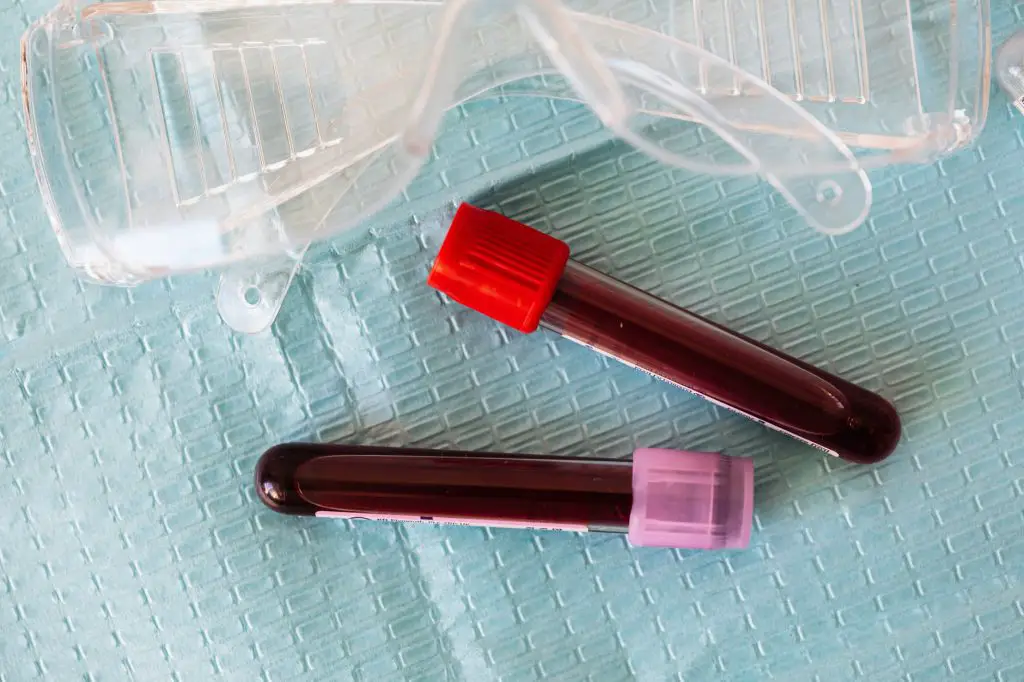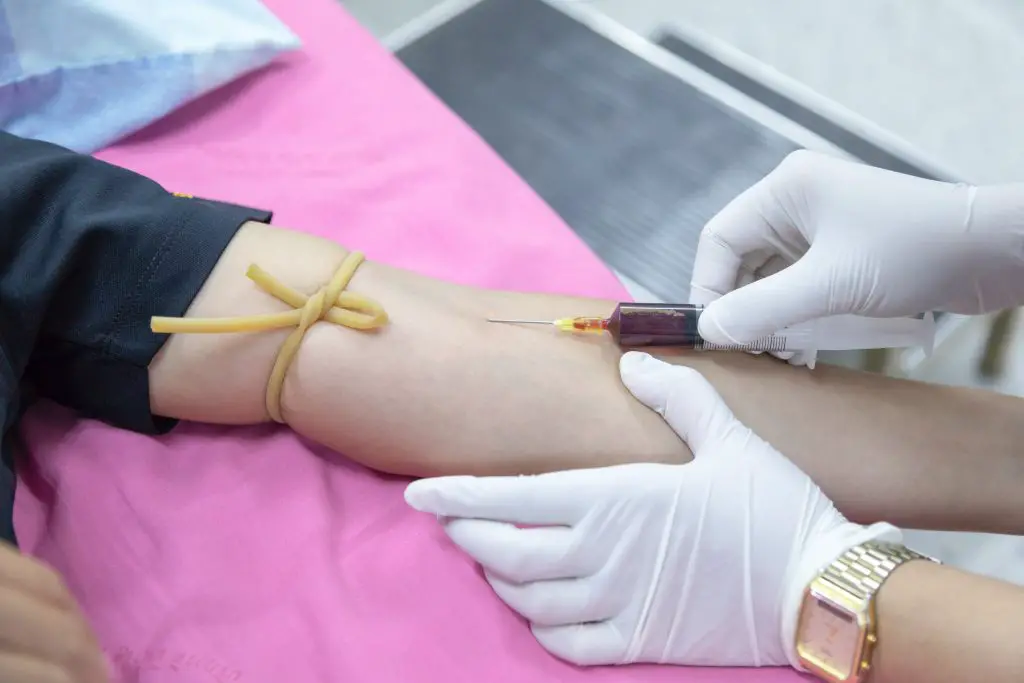Are you thinking about giving blood but wondering if it affects your gym performance?
Donating blood is a heroic act that can save many lives. It is not complicated, but it’s a delicate process, especially for the recovery.
So, it is essential to know the advice, the recommended diet, and above all, the amount of time necessary to fully recover.
Do you want to know more about this topic? Stay with us and discover everything you always wanted to know about working out after giving blood.
What is donating blood?

Blood donation is a medical process that consists of draining blood out of a person and injecting it into another one. It can also work for medical research.
Although, the process is pretty simple, you need to meet specific requirements, such as having slept and eaten well.
Usually, you would also check some blood values like sugar with a small prick on your finger.
If everything is ok you are placed on a comfortable stretcher. Then, a qualified person takes a line of blood from your arm, which is connected to a blood bag and finally, transfused there which usually takes about 20 minutes.
Do you know how much blood is in the donation bags? Roughly half liter. That is the maximum allowed that they can extract from you.
Take into consideration that donating blood, like every medical process, must be carried out by health professionals supported by medical institutions (especially if you plan on working out after giving blood).
Hospitals and clinics usually have their blood bank.
Why is it important to donate blood?

Blood transfusions are not only necessary in the treatment of several diseases, but they are also a vital source in extreme medical circumstances, such as the like hemorrhages suffered by victims of traffic accidents.
For you, it is half a liter less blood, but for other people, it is the difference between life or death.
Requirements to donate blood
- Be over 18 and under 65.
- Weigh more than 110 pounds.
- Do not be in a fasted state.
- Not have donated blood in the last two months.
- Not have, nor have had, diseases that are transmitted by blood.
- Pass a simple medical examination and a health questionnaire.
Benefits Of Donating Blood
Donating blood is a selfless act that can save many lives, but did you know that it is also beneficial for the donor?
It rejuvenates the body.
When the fluid level decreases, our bodies generate new cells, producing clean, fresh blood.
It balances iron in your body.
The average adult has 5 grams of iron in the body, and when donating blood, it decreases because a little of it is lost, but after a few days, it is replaced and balanced through food.
It improves blood circulation.
After a donation, blood flows better in the body, reduces arterial blockage, and this reduces the risk of heart attacks to strokes.
It gives you a medical review.
To give blood it is vital to check the blood pulse, pressure and sugar levels. So you will get a simple but essential health review.
Working Out After Donating Blood
By donating, we give about half a liter of our blood, and the level of iron in our body decreases.
But, if we take specific measures, we can return to our physical activity after 24 hours or so.
What are those measurements? EASY: drink plenty of liquids and rest.
There is no contraindication for athletes to donate blood since donation does not pose health risks.
However, it’s advisable not to resume high-demand exercises immediately, but rather to apply medium intensity.
For example, running after donating blood is not recommended.
In the same direction, it is also not recommended to participate in highly demanding competitions immediately.
The best is to wait a few days or even a couple of weeks.
And all this depends on the sort of exercise, the type of competition, and the individual needs of each person.
Remember that you should wait at least 24 hours to resume training, and ideally, it should be of moderate intensity.
Take your body to the next level with these hardcore supplements for bulking, cutting and strength.
What happens in Your body after donating blood?
By donating blood, we submit our body to singular circumstances, and this causes some effects in our bodies.
It is necessary to know them and consider them when returning to our work out routine.
1. Donating blood lowers hemoglobin levels and reduces oxygen transport to the muscles.
2. Iron is crucial for sports performances, and by donating blood, the iron levels in our body decrease.
This situation will make us feel out of shape, but it can be counteracted by having foods high in iron, or even with supplements.
3. If you’re planning on working out after giving blood without the proper recovery period, you’ll feel tired quickly.
This feeling is normal, and will only last a couple of days.
4. Your body loses liquids while donating blood, and when we exercise, the fluids we ingest concentrates on the physical activity.
This combination could eventually cause dehydration. The best thing to do is to drink a lot of liquids, even more, when exercising.
5. Physical performance is decreased right after a donation, but it is only a matter of time for it to get completely recovered.
what exercises should you do after donating blood?
Do you want to work out after giving blood?
This exercises are very manageable, and you can adjust the intensity depending on your performance.
Remember that experts recommend waiting 24 hours to exercise after donating blood and drinking plenty of fluids.
Walking
This one is the best exercise of all since it is low impact and has excellent results in blood flow.
Walking activates your entire body allowing you to control the intensity, depending on how you feel.
It is so therapeutic that it is the first activity doctors advise after surgery.
Cycling and Swimming.
These two exercises are excellent because they are also low impact, help blood circulation, and free a lot of tension.
However, if you have donated blood, it is recommended that you take certain extra precautions when practicing them.
how to resume exercising after donating blood?
After donating blood and resuming exercise, you will tire more quickly, and you may be at risk of becoming dehydrated.
But after a few weeks, you will be at your optimum performance.
Drinking lots of liquids, and doing a moderated exercise routine is recommended.
The main thing is that you listen to your body. Do not try harder than necessary, and if you need a stop, do it.
To begin, you can do 15 seconds of each of the following exercises and rest for at least for 30 seconds.
You can repeat the routine as many times as you feel necessary, but specialists recommend that you start with only three sets.
Run in place.
Perform this exercise at a moderate speed, and do not raise your knees too high.
Jumping Jack.
This exercise is excellent for building strength. All you have to do is to jump while opening and closing your arms and legs.
Do it smoothly, and if you feel good, you can increase the speed a bit.
Squats.
This fundamental exercise will help us regain stability and strength. Go down as far as you can without forcing yourself.
Push-ups.
You can start by resting your knees on the floor, you must recover your strength, little by little.
You can even do it standing up, leaning against the wall. Remember to follow your body commands.
Bicycle.
This exercise tries to recreate the activity on the bike, but more securely.
What you should do is lie on your back on the floor, raise your legs and make circular movements, as if you were pedaling.
What to eat after giving blood?

These are some pieces of advice that will help your body to recover the regular values, and therefore, resume your physical performance:
To recover iron: red meat, beans, spinach, legumes, and fortified cereals.
To acquire vitamin B6, Sardines, salmon, corn, avocado, and banana.
For vitamin B: sardines, oranges, and asparagus.
Vitamin B12: chicken, fish, eggs, and almonds.
Eating these healthy foods daily will help you recover faster and thus, working out after giving blood.
What About Nutrient injections?
To recover faster, doctors recommend nutrient injections, but not through needles, but rather through smoothies.
Green juices and smoothies are high in vitamin C, B12, iron, and many other nutrients.
With these smoothie recipes, you will see how you feel less fatigued.
Three in one.
This smoothie has three ingredients and a powerful result.
– 1 beet.
– 5 oranges.
– 1 carrot.
Process all ingredients with a cup of water and drink a glass each morning.
Flavor Explosion.
This mix is a winning combination.
– 15 strawberries.
– 1 cooked beet.
– ½ teaspoon fresh ginger.
– 500ml of water.
Mix all the ingredients and drink a glass once a day.
Tropical Smoothie.
Excellent for recovering hemoglobin.
– 3 guavas.
– 4 oranges.
– 4L of water.
Mix all the ingredients and drink a glass every morning.
Life support smoothie.
This smoothie is excellent for recovering iron levels in your body and thus helping you work out after donating blood.
– One cup of red berries (can be frozen or fresh).
– ¼ cup dates.
– One frozen banana.
– ½ teaspoon of cinnamon.
– One and a half cups of water.
Mix all the ingredients and drink a glass a day.
Smoothies are an excellent way to regain the nutrients you have lost while donating blood.
They are also surprisingly easy to make and very tasty.
If you already have smoothies in your diet, you should just look for those best adapted to restore hemoglobin and iron.
And if this is your first time trying smoothies, you will surely want to keep them in your regular diet. There is a diversity of tasty options.
Final Thoughts – Exercise After Donating Blood
Working out after giving blood is not a risky thing to do.
But it does not hurt to take the necessary measures for your recovery to be adequate, and you can regain your optimal performance in the shortest possible time.
But, always remember that even if it takes you a few weeks to regain your fitness, that little sacrifice will save lives.
If you meet all the requirements, we invite you to consider donating blood.
It is a simple process, recovery is quick, you will be able to resume your activities with total normality after 24 hours, and the result is invaluable, with a few simple steps you will be working out after giving blood.
Besides, the feeling after donating blood is quite unusual.
You may feel slightly weak, but at the same time, you will sense that a powerful bond with the environment overcomes you.
It is one of the most powerful actions you are going to perform in your life.
Your blood will run through the veins of another human being, another heart will be pumping your blood, and will continue to beat thanks to your small sacrifice.
Take a few minutes of your life, to save someone’s life, and met the unexplainable feeling of being a part of something greater than yourself.
If this altruistic goal is not enough for you, feel encouraged by the mere idea of having an extra punch for your body rejuvenescence, while boosting and cleaning itself every time in a while.



As someone with a family member who has benefitted from donated blood I can vouch on how lifesaving this procedure is. I make it a point to donate blood once a year nearing my birthday, just as a reminder to give back and help out someone who might need it more. I never knew though the kind of food that we could eat that would benefit the recovery process more so I super appreciate how you’ve gone into detail about that here. I am scheduled to make a donation next month! Thank you so much for discussing a topic that needs to be raised up more, it will save more lives.